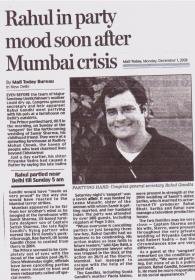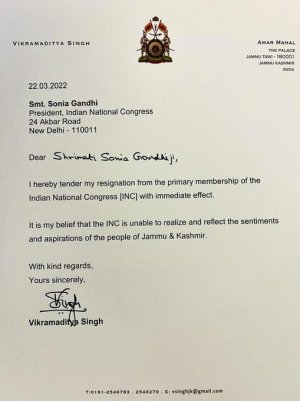Rahul Gandhi’s Cambridge interview shows how out of touch he is with the mood of the nation
With the Chinese provocations in Ladakh and Arunachal Pradesh, Rahul Gandhi should have taken the opportunity to roundly condemn China, lambast its imperialist tendencies and expose the flaws in its political system, rather than praise its vision for other countries. (File image)
Congress leader Rahul Gandhi, in a recent interview at Cambridge University, offered a rare peek into his view of geopolitics. And what that peek revealed was not pretty.
He said the US and China offer two competing visions for the world. So far so good. He then went on to say, controversially, that China is offering the nations around it, through its Belt & Road Initiative, ‘the idea of prosperity’. Sri Lankan citizens would beg to differ.
He argued that the US vision had no corresponding idea of prosperity for other countries. He said, ‘If China is promising prosperity, you can’t say to India we will have a defence pact and we will fight with China, without the prosperity part of it.’ He said when we talk to the US, we talk a lot about defence, but we don’t talk about how we can create a democratic model that can make people rich.
Really? Let’s take the facts one by one. First, China’s Belt & Road Initiative doesn’t have at its root ‘the idea of prosperity.’ Far from it. It’s not from Chinese benevolence that it is undertaking these projects. Instead, a crisis of over-investment in China has forced it to deploy its surpluses in projects outside the country, so that it can use the excess industrial capacity it has built up. Arguing that this offers the ‘idea of prosperity’ is akin to saying that British investment in the railways in colonial India was based on an idea of shared prosperity.
The Chinese state often uses the BRI as a beachhead to achieve its strategic aims. Pakistan is an obvious example, as is Sri Lanka. And as Sri Lanka, Montenegro, and the opposition to projects in several other countries show, the terms of the contracts are often iffy. And yet it was the interviewer who had to remind Gandhi that the BRI was not all it was touted to be, as seen in Sri Lanka.
A report by AidData, a development research lab based in Virginia, found last year that 35 percent of the BRI infrastructure project portfolio has encountered major implementation problems, such as corruption scandals, labour violations, environmental hazards, and public protests. Indeed, with the pandemic having weakened the financial status of several of these projects, the Chinese themselves are worried, and last November President Xi Jinping in a speech laid stress on risk prevention and control ‘so as to avoid danger and chaos.’
What’s more, with the sanctions against Russia by the European countries likely to persist for a long time, there’s a big question mark on the viability of the Eurasian Railway, the iron silk road from China to Europe. And yet Rahul Gandhi made no mention of the BRI’s drawbacks.
Let’s come now to the US-India relationship. It simply isn’t true that Indo-US ties are based on defence. Here are some figures:
1) In 2021-22, exports from India to the US made up 18 percent of total Indian goods exports, while exports to China were 5 percent. The European Union accounted for 11 percent.
2) In 2021-22, provisional figures for Foreign Direct Investment into India show that the US accounted for 17.9 percent of total FDI.
3) 2020 data show that the NRI population in the US was 2.7 million, second only to NRIs in the UAE. It’s no wonder then that remittances from the US account for over a fifth of total remittances into India.
Moreover, services exports from India are predominantly to the US, UK, and Japan.
In other words, Rahul Gandhi seems to have grossly underestimated the West’s economic engagement with India. Surely our trade and investment ties with the West do more for prosperity in India than imports from China, which have hollowed out the Indian manufacturing sector?
Far more important than economic ties are the values that we share with the West. These include democracy, freedom of the press, an independent judiciary, and a free economy —all the elements that go towards ensuring individual freedom. To be sure, our societies may fail to reach the ideal in many respects, but the ideals we cherish are never in doubt.
Contrast that to the Chinese totalitarian dictatorship, where one party’s diktat is law, power grows out of the barrel of a gun, surveillance and censorship is pervasive and there is no political, economic, or personal freedom.
In the new Cold War that is taking shape, do we really want to be part of a group whose members are China, Russia, Iran, and North Korea? In fact, the only reason we have to be silent on Russia’s invasion of Ukraine is because of our unfortunate dependence on Russian arms, a dependence we should speedily do away with. In the clash of visions that Rahul Gandhi spoke about, choosing which side to be on is a no-brainer. It is strange that he did not recognise it.
There may also not really be a conflict between freedom and prosperity. To be sure, China has made tremendous progress under its dictatorship, but the Faustian bargain the Chinese leadership made with its people—offering them economic growth in exchange for giving up their basic rights---is now in danger of unravelling. The Chinese economy’s debt-fuelled growth is now in serious jeopardy, made worse by Xi Jinping’s irrational policies.
This has opened up a huge opportunity for India. The West recognises it very well, which is why they have been relentlessly wooing India. Unfortunately, Rahul Gandhi seems to have no inkling of it.
Finally, and perhaps most importantly for the Congress, the Cambridge interview revealed another important thing. Surely, with the
Chinese provocations in Ladakh and Arunachal Pradesh, Rahul Gandhi should have taken the opportunity to roundly condemn China, lambast its imperialist tendencies and expose the flaws in its political system, rather than praise its vision for other countries? Does he not know that China is feared and disliked by Indians, while on the other hand millions of Indians have family ties with the US and it is the destination of choice for many of our aspiring young men and women? That Rahul Gandhi does not recognise this basic fact, or at least failed to take advantage of it during the interview, shows not only what is wrong with his world view, but also how far out of touch he is with the pulse of the nation. That is the lesson the Congress should draw from the interview.
https://www.moneycontrol.com/news/opinion/rahul-gandhis-cambridge-interview-shows-how-out-of-touch-he-is-with-the-mood-of-the-nation-8601971.html






 )
)


 )
).png)

 ), more pain awaits you.
), more pain awaits you.  So maybe some comfort there.
So maybe some comfort there.










